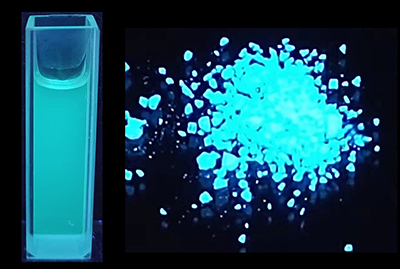FOR IMMEDIATE RELEASE
“Amorphous Sugar Materials as Sustainable and Scalable Alternatives for Rigid, Short-Term-Use Products”
ACS Sustainable Chemistry & Engineering
Single-use hard plastics are all around us: utensils, party decorations and food containers, to name a few examples. These items pile up in landfills, and many biodegradable versions stick around for months, requiring industrial composting systems to fully degrade. Now, researchers reporting in ACS Sustainable Chemistry & Engineering have created a sturdy, lightweight material that disintegrates on-demand — and they made it from sugar and wood-derived powders. Watch a video about the material here.
Sturdy, degradable materials made from plants and other non-petroleum sources have come a long way in recent years. For example, cornstarch-based packing peanuts disappear simply by dousing them in water, and some utensils are based on polymers synthesized from plant sugars. But those packing peanuts can’t be used to protect anything wet, and plant-derived polymers still take a long time to break down. One potential alternative is a new type of rigid material designed from isomalt, which is a sugar alcohol rather than a polymer. With isomalt, bakers can create breathtaking, but brittle, structures for desserts, and then dissolve them away quickly in water. So, Scott Phillips and colleagues wanted to boost the sturdiness of isomalt with natural additives to create a robust material that degrades on-demand.
The researchers heated isomalt to a liquid-like state and mixed in either cellulose, cellulose and sawdust, or wood flour to produce three different materials. Then, using commercial plastics manufacturing equipment, the materials were extruded into small pellets and molded into various objects, including balls, a dodecahedron, a chess piece and flower-shaped saucers. All of the tested additives doubled the strength of isomalt, creating materials that were harder than plastics, including poly(ethylene terephthalate) (known as PET) and poly(vinyl chloride) (known as PVC), but were still lightweight. In experiments, samples dissolved in water within minutes. And saucers made of the material, and coated with a food grade shellac and cellulose acetate, withstood being immersed in water for up to seven days. However, once the saucers were broken and the coating cracked, they rapidly disintegrated in water. The team also repeatedly crushed, dissolved and recycled both coated and uncoated objects into new ones that were still as strong as the original items.
The researchers say that the material could be used for food-service items and temporary décor, and then crushed and sprayed with water to fall apart. But even if such items were simply tossed into the trash or somehow got into the environment, the slightest crack in the coating would start their collapse into sugars and the plant-based additives, which the researchers say might be good for soil.
The authors acknowledge funding from Boise State University and the Army Research Office.
###
The American Chemical Society (ACS) is a nonprofit organization chartered by the U.S. Congress. ACS’ mission is to advance the broader chemistry enterprise and its practitioners for the benefit of Earth and all its people. The Society is a global leader in promoting excellence in science education and providing access to chemistry-related information and research through its multiple research solutions, peer-reviewed journals, scientific conferences, eBooks and weekly news periodical Chemical & Engineering News. ACS journals are among the most cited, most trusted and most read within the scientific literature; however, ACS itself does not conduct chemical research. As a leader in scientific information solutions, its CAS division partners with global innovators to accelerate breakthroughs by curating, connecting and analyzing the world’s scientific knowledge. ACS’ main offices are in Washington, D.C., and Columbus, Ohio.
To automatically receive press releases from the American Chemical Society, contact newsroom@acs.org.
Note: ACS does not conduct research, but publishes and publicizes peer-reviewed scientific studies.







